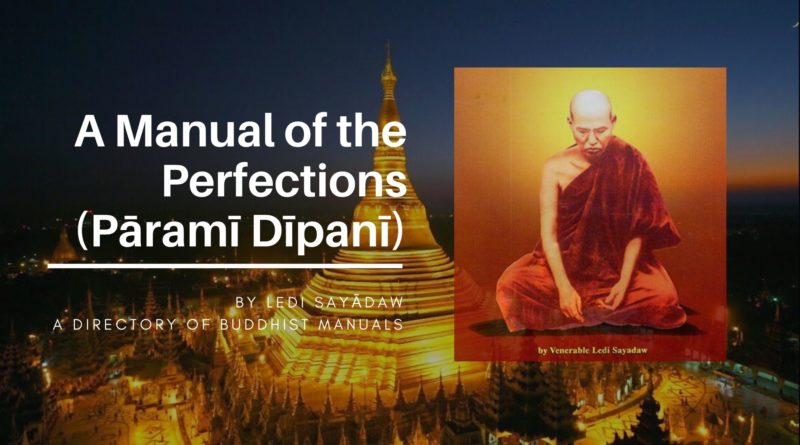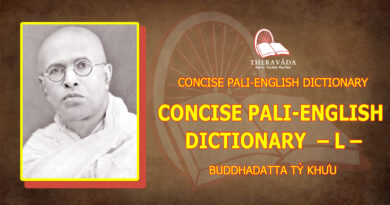A Manual Of The Perfections (pāramī Dīpanī) – The 20 Questions – Ledi Sayadaw
MAIN CONTENT
- A Manual of the Perfections
- The Twenty Questions
- The First Question ⁰⁰¹
- The Second Question ⁰⁰²
- The Third Question ⁰⁰³
- The Fourth Question ⁰⁰⁴
- The Fifth Question ⁰⁰⁵
- The Sixth Question ⁰⁰⁶
- The Seventh Question ⁰⁰⁷
- The Eighth Question ⁰⁰⁸
- The Ninth Question ⁰⁰⁹
- The Tenth Question ⁰¹⁰
- The Eleventh Question ⁰¹¹
- The Twelfth Question ⁰¹²
- The Thirteenth Question ⁰¹³
- The Fourteenth Question ⁰¹⁴
- The Fifteenth Question ⁰¹⁵
- The Sixteenth Question ⁰¹⁶
- The Seventeenth Question ⁰¹⁷
- The Eighteenth Question ⁰¹⁸
- The Nineteenth Question ⁰¹⁹
- The Twentieth Question ⁰²⁰
A Manual of the Perfections
Pāramī Dīpanī
by Ledi Sayādaw Mahāthera, Aggamahāpaṇḍita, D.Litt.
Namo Tassa Bhagavato Arahanto Sammāsambuddhassa
Veneration to the Exalted One, the Worthy One,
The Perfectly Self-Enlightened Buddha.
Object of the Questioner
Pucchaka ganthārambha ⁰¹
“Pañhā byākaraṇecchekaṃ,
Buddhaṃ paṇamya pucchisaṃ.
Pañhā byākaraṇecchekaṃ,
taṃ taṃ bodhisusaṃyuttaṃ.”
“Homage to the Buddha,
The Adept in questioning and answering!
Worshipping thus done,
I now address myself to the task
Of posing questions –
Intended to foster skilful answering thereto –
On matters pertaining particularly
To the various classes of Enlightened Ones.
The Twenty Questions
The First Question ⁰⁰¹
Someone fulfils meritorious deeds, such as giving, with a view to perfection through sufficiency of merit, wishing for both mundane and supramundane benefits. Will he reap benefits thereof in the mundane field such as high birth and material prosperity; or will he attain to Path and Fruition Knowledge culminating in the bliss of nibbāna? Or will he reap benefits both ways, i.e., mundane as well as supramundane? Or will he miss both?
The Second Question ⁰⁰²
Someone, on the other hand, fulfils meritorious deeds, such as giving and so on, wishing solely for mundane merit. Will he enjoy the fruit thereof in the mundane field only or will he also attain to supramundane bliss (nibbāna)?
The Third Question ⁰⁰³
Further, someone fulfils meritorious deeds, such as giving and so on, wishing solely for supramundane knowledge (nibbāna). Will he attain to such knowledge (nibbāna), or will he also enjoy mundane benefits thereof?
The Fourth Question ⁰⁰⁴
(a) Now, the Perfectly Enlightened Ones, the All-seeing Buddhas, attain Buddhahood after going through a process of perfecting themselves in merit, such as giving and so on, over periods of four incalculable aeons ⁰² (asaṅkhyeyya) and a hundred thousand great aeons ⁰³ (mahā-kappa), or eight incalculable aeons and a hundred thousand great aeons, or sixteen incalculable aeons and a hundred thousand great aeons.
(b) Solitary Buddhas (Paccekabuddhas) attain enlightenment by themselves after going through a process of perfecting themselves in merit, such as giving, and so on, over two incalculable aeons and a hundred thousand great aeons.
(c) And the Chief Disciples (aggasāvaka) attain enlightenment after going through a process of perfecting themselves in merit such as giving, and so on, over one incalculable and a hundred thousand great aeons.
(d) And the Great Disciples (mahāsāvaka) attain enlightenment after going through a process of perfecting themselves in merit, such as giving and so on, over a hundred thousand great aeons.
(e) And the ordinary disciples (pakatisāvaka) attain enlightenment after going through a process of perfecting themselves in merit, such as giving and so on, over a hundred great aeons, or over a thousand great aeons.
As regards each of the five classes of Enlightened Ones, i.e., the Perfectly Enlightened Buddha, the Paccekabuddha, the Chief Disciples, the Great Disciples and the Ordinary disciple, are the requisite periods of fulfilling their perfections to be counted beginning from the time of their expressing their respective wishes for the particular kind of enlightenment; or are they to be predicted ⁰⁴ (vyākaraṇa) from the Buddha concerned?
The Fifth Question ⁰⁰⁵
Do all those various Enlightened Ones win enlightenment by fulfilling the perfections only after receiving the prediction, or do they win enlightenment by fulfilling the perfections without (even) receiving the prediction?
The Sixth Question ⁰⁰⁶
Further, do those future Enlightened Ones, once having been blessed with the prediction, again wish for a different class of enlightenment other than the one assured for? Or don’t they?
The Seventh Question ⁰⁰⁷
Someone fulfils meritorious deeds such as giving and so on, without wishing for any specific class of enlightenment, but simply wishing for realising Path Knowledge, its Fruition and nibbāna; what type or class of enlightenment is he entitled to (katamāya bodhiyā bujjheyya)?
If it is the wish of the future Enlightened One to gain enlightenment as a Disciple on fulfilling the necessary perfections, does he attain enlightenment as he wished for (i.e., as a Disciple)? If it is the wish of the future Enlightened One to gain enlightenment as a Paccekabuddha on fulfilling the necessary perfections, does he attain enlightenment as he wished for (i.e., as a Paccekabuddha)? If it is the wish of the future Enlightened One to gain enlightenment as a Perfectly Enlightened One, or Buddha, on fulfilling the necessary perfections, does he attain enlightenment as he wished for (i.e., as a Buddha)?
The Eighth Question ⁰⁰⁸
Someone fulfils meritorious deeds such as giving and so on, wishing for enlightenment as a Disciple. Would he, either in the course of fulfilling the necessary perfections, or on having fulfilled the necessary perfections, wish for any other class of enlightenment (i.e., other than that of a Disciple)? Or would he not? Supposing he does wish for some other class, would his wish be fulfilled or would it not? If his alternative wish be allowable, would it be as the result of partial, i.e., supplementary, fulfilment of the perfections instead of the whole that would have been necessary? Or else, would the attainment be conditioned by a fresh undertaking of fulfilling the necessary perfections?
The Ninth Question ⁰⁰⁹
Someone fulfils meritorious deeds such as giving and so on, wishing for enlightenment as a Paccekabuddha. Would he, either in the course of fulfilling the necessary perfections, or on having fulfilled the necessary perfections, wish for any other class of enlightenment (i.e., other than that of a Disciple)? Or would he not? Supposing he does wish for some other class, would his wish be fulfilled? Or would it not? If his alternative wish be allowable, would it be as the result of partial, i.e., supplementary, fulfilment of the perfections instead of the whole that would have been necessary? Or also would the attainment be conditioned by a fresh undertaking of fulfilling the necessary perfections?
The Tenth Question ⁰¹⁰
Someone fulfils meritorious deeds such as giving and so on, wishing for enlightenment as a Perfectly Enlightened One, the Buddha. Would he, either in the course of fulfilling the necessary perfections, or on having fulfilled the necessary perfections, wish for any other class of enlightenment (i.e., other than that of a Disciple)? Or would he not? Supposing he does wish for some other class, would his wish be fulfilled? Or would it not? If his alternative wish be allowable, would it be as the result of partial, i.e., supplementary, fulfilment of the perfections instead of the whole that would have been necessary? Or else would the attainment be conditioned by a fresh undertaking of fulfilling the necessary perfections?
The Eleventh Question ⁰¹¹
Do Paccekabuddhas and Disciples of the Buddha attain enlightenment after fulfilling the full thirty kinds of perfection; or do they attain enlightenment after fulfilling something less than that?
The Twelfth Question ⁰¹²
What is the minimum period for fulfilling the perfections for enlightenment as a Buddha’s Disciple? Does one have to fulfil perfections for that minimum period so as to attain enlightenment?
The Thirteenth Question ⁰¹³
Do those future disciples (i.e., the Chief Disciples, the Great Disciples and the Ordinary Disciples) who have fulfilled their respective perfections and who happen to be born in a Great aeon devoid of a Buddha (Buddha-suñña-kappa) attain enlightenment on their own? Or do they have to mark time until a great-aeon wherein the Buddha arises (Buddhuppāda-kappa) comes round?
The Fourteenth Question ⁰¹⁴
Do the Buddha, the Paccekabuddha and the Disciples of the Buddha receive their respective predictions that are of uniform factors; or are the various predictions of varying factors?
The Fifteenth Question ⁰¹⁵
Do the Perfectly Enlightened Ones, the Buddhas, only personally receive the prediction? Do the Paccekabuddhas and the Disciples of the Buddha also personally receive the prediction?
The Sixteenth Question ⁰¹⁶
Do all men or Devas or Brahmās need to fulfil the perfections covering the whole period allotted for the Disciples of the Buddha (Buddhasāvaka) i.e., Elders (thera), Elder Nuns (therī), Novices (sāmaṇera),Female Novices (sāmaṇeri), and Female Probationers (sikkhamānā)? Or do they attain enlightenment after fulfilling the predictions for some lesser periods?
The Seventeenth Question ⁰¹⁷
Do the Buddhas, Paccekabuddhas, and Disciples of the Buddha arise only in this world-system? Or do they arise in other world-systems as well?
The Eighteenth Question ⁰¹⁸
Further, do the Buddhas, Paccekabuddhas, and Disciples of the Buddha, having been born in this world-system, fulfil the perfections just here? Or do they take birth and fulfil the perfections in other world-systems as well?
The Nineteenth Question ⁰¹⁹
Moreover, do the Buddhas, Paccekabuddhas, and Disciples of the Buddha take birth and fulfil the perfections in the Southern continent of Jambudīpa ⁰⁵ only; or do they take birth and fulfil the perfections elsewhere, i.e., in the other (three) continents and the surrounding lesser islands thereto, and the lesser islands of the Southern continent itself such as Sīhala Island, Nāga Island, etc.?
The Twentieth Question ⁰²⁰
Further, in the Southern continent itself, do the Buddhas, Paccekabuddhas, and Disciples of the Buddha, take birth and fulfil the perfections in the Middle Country (Majjhimadesa) only; or do they take birth and fulfil the perfections in the outer regions (paccanta desa) as well?
The Way of the Wise ⁰²¹
(a) It is usual with questioners to concern themselves with one aspect of the matter only; for if they were to deal with the full aspects to a subject there would be no case for framing a question at all. No question would then arise. However, now that a series of questions are hereby framed it now behoves someone to tackle them.
(b) Why the need for tackling them? Because every question calls for an answer: where there is a question there always is some answer.
As the Saddasāratthajālinī puts it:
“Where there is obviously an answer,
It is up to the wise man to raise a (fitting) question to it.”
And then the complementary stanza which says:
“Where there is obviously a question,
It is up to the wise man to come up with the answer.”
(c) Now that there are this series of questions and that they demand answers, I call upon those who feel themselves competent, that is, who are standard-bearers of the Buddha’s Teaching (sāsanadhajūpamā), the pennons of the proud continent of Jambudīpa, and within whose province the task lies (this not being the province of charlatans), who, citing good authority from their encyclopedic knowledge of the canonical texts and commentaries thereon, will interpret the inherent, natural meaning of the questions and satisfy the questioner beyond a shred of doubt, to answer these twenty questions.
(d) If one should be incompetent, that is, not able to answer clearly and well in the aforementioned manner, one had better remain silent, with shoulders drooped and mouth shut, looking downcast, like the tree-stump at the cross-roads, or the door-slab.
(e) However, why should the incompetent keep their silence? It is because certain competent persons will rise to the occasion: they being far superior to you are quite able to acquit themselves well (in the task of answering). Like the maned lion (kesarasīha), the noblest of the four kinds of lion — the other three being the brown lion (paṇḍu-sīha) the grass[-eating] lion (tiṇa-sīha) and the human-bodied lion (nara-sīha or manussīha) — who is the king of beasts, the wise one renowned for his learning in the Three Baskets of scriptures having nine divisions, together with commentaries, and subcommentaries thereon, will spell out the answers with the greatest confidence and mastery just as the king of beasts makes his roar that reverberates in the whole forest of three thousand leagues. When such a man of distinction takes upon the fitting task in elaborate skillfulness let the mediocre keep their silence!
Here ends the Twenty Questions posed by the late Sankyaung Sayādaw of Mandalay.








